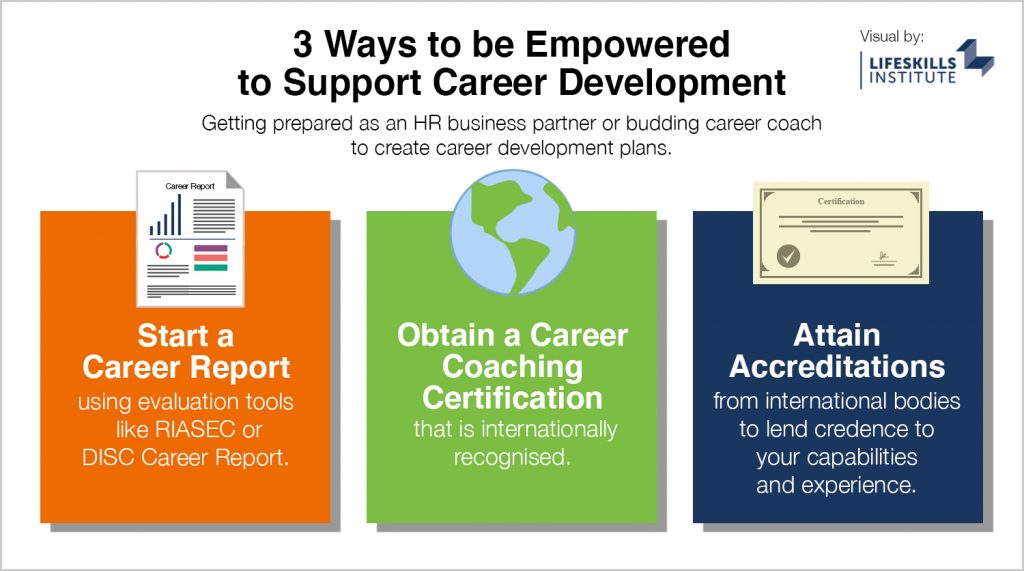
Source: Pexels – Alexander Suhorucov
How can HR be empowered to support career development plans?
According to Mercer’s Global Talent Trends 2020-2021 report[1] the most important factor employees said they wanted in their career growth is the opportunity to grow personally and professionally. The fourth most important point the responders indicated in the same study was for their manager to be equipped to have useful career conversations no matter where the employee is in their life (young professional, returning parent, nearing retirement etc.).
How can HR and career coaches be better equipped to assist with workers’ career development plans?
Just so we are on the same page here’s what we mean by career development. It is an on-going process of developing one’s career including periodically defining new career goals and acquiring the relevant skills to reach them. A career development plan is made with the intention to move laterally, vertically or make a career change within the same organisation, move to a different organisation or start one’s own business. It is made up of several stages:
- an assessment stage focusing on self-assessment
- an exploration stage which includes exploring options and making certain commitments
- a preparation stage which can include developing a career action plan
- an implementation stage which can include acquiring new or updated skills if necessary, or speaking with relevant personnel and
- a decision-making stage which includes checking if the decision meets the career goals, interests, strengths, and values of the individual

Source: Pexels – Alexander Suhorucov
The role of HR in facilitating career development plans
Achievers Workforce Institute’s 2022 Engagement and Retention Report found that close to half of its 500 respondents in Singapore (45%) were considering looking for a new job in 2022 and close to a third (27%) said they were undecided. Close to half (47%) indicated they job hunted during the pandemic. The number one reason cited for leaving a job was career progression.
Nearly a quarter of Singapore workers intend to leave their current employer by June 2022 according to a survey[2] by global jobs portal Indeed. Nearly half indicated that they would consider staying if there was career progression in their current jobs.[3]
Mercer’s global report[4] found that 63% of employees trust their company to invest in their skills while 55% trust their organisation to teach them the new skills required should their job change or cease to exist.
Bestselling author of eight books, Ron Carucci, wrote[5] that ‘forced into self-reflection during extended WFH, workers have questioned the value of their work and the sense of meaning it provides’.
Based on what has been gathered by various professionals, it seems evident that HR and career coaches can play a key role in filling the need for a career development plan for working professionals.
Is there a bag of tools or a list of items they need to look at to help them deliver this output?

3 ways to be empowered to support career development plans
As illustrated earlier, the needs are real and varied. Are you prepared as an HR business partner or budding career coach to offer help in the area of career development plans for those who are employed, displaced, searching for a new direction? How can you start being empowered in this area?
- A smart place to start is with a career report using evaluation tools like RIASEC or DISC Career Report.
This would be a good resource for the assessment stage of the career development process. The DISC Career Report will give your client an insight into himself and his inherent strengths as well as limitations. This would then help him identify possible career choices that make sense to him and would enable him to confidently face his career challenges and choices.
- Obtaining an internationally recognised career coaching certification will provide you with the tools you’ll need to succeed as an internal or external career coach.
Such certification courses will equip you with the relevant tools that would enable you to explore your client’s career values as well as motivated, developmental, burnout and unimportant skills. By taking the skills audit, your client would be better able to make a decision on what type of roles he can pursue and which competencies he can develop. You’ll also be able to help him understand the underlying motivations behind his decision making process or actions with regards to his career and life.
- Accreditations from international bodies lends credence to your capabilities and experience.
Accreditations from international bodies ensure that you are undergoing training in an institution that meets acceptable levels of quality at an international level. You will feel confident the institution maintains consistency in its training content and delivery standards which are pegged at an international level. It will also boost your confidence in your ability to provide career coaching services or construct a career development plan.
Creating the time but removing the dread: the quest to empowerment
Preparing the workforce for a more purposeful work life goes beyond reskilling or upskilling. It involves exploring the inner being of the individual to discover his reason for being. His self-discovery journey of his career values, motivated skills and deep passion should not be overshadowed by the demand for skills in AI and automation.
Finding the right tools and community to support you in that quest for your clients’ or workforce’s self-discovery journey may take time but need not be tedious if you take into consideration the three factors above in making your selection.
©Published by Lifeskills Institute Pte Ltd
Lifeskills Institute’s Certified Career Coach programme is accredited by The Institute of Training and Occupational Learning, UK’s elite professional body for trainers and learning & development professionals. In the Year 2000 the UK government granted it the ‘Institute’ status and since then it has become recognised as the premier organisation for everyone involved in the world of training and development.
The DISC Career Report is administered by Lifeskills Institute through our partnership with The Institute for Motivational Living (IML) – a world leader in developing, publishing and delivering customised, behavioral assessments. For over 30 years, IML has been observing, analysing, and enhancing human behavior in personal and corporate relationships.
Lifeskills Institute is IML’s Master Training and Certification Centre for Asia as well as its Master Distributor for Asia.
[1]-https://www.mercer.com/content/dam/mercer/attachments/private/global-talent-trends/2021/gl-2021-gtt-global-eng-mercer.pdf
[2]– Global job portal Indeed carried out the survey in December 2021 amongst about 1,000 Singapore workers: https://www.todayonline.com/singapore/nearly-quarter-spore-workers-intend-quit-their-jobs-first-half-2022-survey-1775126
[3]– Other factors Singapore workers would consider to stay in their current role include higher compensation (56% said this), flexible working options (56%), appreciation from bosses (41%), access to good healthcare (33%) and mental health support initiatives (30%)
[4]– https://www.mercer.com/content/dam/mercer/attachments/private/global-talent-trends/2021/gl-2021-gtt-global-eng-mercer.pdf
[5]– Harvard Business Review, 11 Oct 2021: To Retain Employees, Give Them a Sense of Purpose and Community

